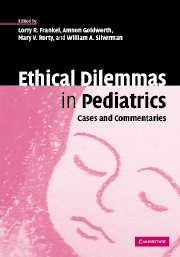Book contents
- Frontmatter
- Contents
- List of contributors
- Preface
- Introduction
- Part I Therapeutic misalliances
- Part II Medical futility
- Part III Life by any means
- Part IV Institutional impediments to ethical action
- 10.1 Ethical problems encountered with oncology and bone marrow transplant patients
- 10.2 Ethics in the pediatric intensive care unit: oncology and bone marrow transplant patients
- 10.3 Topical discussion
- 11.1 Nursing perspectives on withholding food and fluids in pediatrics
- 11.2 Ethics and clinical decision making: withholding food and information
- 11.3 Topical discussion
- 12.1 Ethics and managed care
- 12.2 Challenging fidelity: the physician's role in rationing
- 12.3 Topical discussion
- References
- Index
- References
12.3 - Topical discussion
Published online by Cambridge University Press: 18 August 2009
- Frontmatter
- Contents
- List of contributors
- Preface
- Introduction
- Part I Therapeutic misalliances
- Part II Medical futility
- Part III Life by any means
- Part IV Institutional impediments to ethical action
- 10.1 Ethical problems encountered with oncology and bone marrow transplant patients
- 10.2 Ethics in the pediatric intensive care unit: oncology and bone marrow transplant patients
- 10.3 Topical discussion
- 11.1 Nursing perspectives on withholding food and fluids in pediatrics
- 11.2 Ethics and clinical decision making: withholding food and information
- 11.3 Topical discussion
- 12.1 Ethics and managed care
- 12.2 Challenging fidelity: the physician's role in rationing
- 12.3 Topical discussion
- References
- Index
- References
Summary
Information and decision making
In an ideal world, in which each patient can assess the quality of medical care and the MCO can determine what maximum profit is, one could determine the Pareto optimal point, i.e., the point of compromise achieved between the competing aims of the patient and MCO in which each can veto the other.
In the real world, quality assessments of medical care by the patient (and for that matter by other individuals or groups of individuals, whether they be part of the healthcare system or not) are fragmented and distorted by economic concerns (“can I afford it?” or “can I reduce costs?”). In addition, it is not at all clear whether the concept of maximum profit has a determinate meaning, or an appropriate application, in the healthcare arena. Furthermore, the patient does not have decision-making powers that are equal to that of the MCO. He or she may opt out of a particular MCO but cannot directly bargain with the MCO for better terms, however these are understood. Indeed, the marketplace itself places powerful constraints on the competing demands of both the patient and the MCO. Thus, the point of compromise is not likely to be the Pareto optimal point.
Conflicts of interest and conflicts of commitment
A complex and difficult feature of professionalism is the level of autonomy of the practitioner.
- Type
- Chapter
- Information
- Ethical Dilemmas in PediatricsCases and Commentaries, pp. 277 - 281Publisher: Cambridge University PressPrint publication year: 2005



